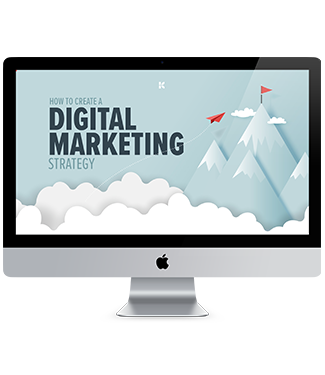
AI in Marketing:
What You Need to Know
You know creating high-quality, well-tailored messaging is key to attracting, converting and retaining customers. But developing personalized marketing efforts at scale can quickly strain your budget and other valuable resources. Simply the idea of gathering, sorting and interpreting the amount of data you need to personalize at the level modern audiences expect is headache-inducing. Even with a room full of data scientists at your disposal, it’s still a seemingly impossible task.
Luckily, marketing technology is a step ahead. Artificial intelligence and marketing are the new power duo that can help your business better define, target and captivate audiences and make sure you’re delivering the right message to the right person at the right time, every time.
To help you prepare to delve into the world of digital marketing and artificial intelligence, here’s some background and tips you need to know.
What Is Artificial Intelligence?
Artificial intelligence (AI) is the capability of computer systems to perform sophisticated tasks that usually require human intervention, such as speech recognition, visual perception and complex decision-making. AI marketing (AIM) is a set of marketing strategies and tools that leverage AI to meet business objectives.
But before you get concerned about losing your job to a robot, let us put your mind at ease. When we refer to using AI in marketing, we mean leveraging machines to handle the more meticulous and menial tasks, such as capturing and parsing data while humans focus on the more creative and big picture aspects of marketing—things AI simply cannot replace.
In short, AI is what helps us work smarter, not harder.
How Does AI Improve Marketing?
For many years, the term “AI” conjured up images from sci-fi creations like the Star Trek series, Terminator and I, Robot. Later, it evolved into a marketing buzzword and something only massive enterprises like Amazon and Google could afford. Today, though, AI is more attainable than ever before, and 61 percent of marketers said AI was their company’s most significant data initiative for the next year, according to a 2018 survey by MemSQL.
3 Ways AI Can Supercharge Your Marketing Efforts
- Make data more actionable. Data can be one of the most valuable assets your organization possesses—if you know how to use it. The challenge is, most marketing teams lack the complex technical skills to interpret large data sets. AI marketing helps translate this raw data into usable information you can use to power your marketing efforts, like behavioral targeting. AI-assisted marketing can also help you enrich your data and create more robust profiles of your contacts, which powers personalization.
- Make true personalization possible. Speaking of personalization, imagine how difficult it would be to write a personalized email, blog post, social post and ad copy for every single contact in your database. The thought alone is absurd. Until now, most marketers have relied on personas to segment their audience, but true personalization seemed impossible.
- With AI, though, you can use personalization tokens and smart content to create an experience designed to meet the contact’s exact needs and behaviors. This means providing a seamless, convenient and enjoyable customer experience that will foster long-term loyalty.
Take the guesswork out of the buyer’s journey. Customer surveys, interviews and other qualitative data can help you become more familiar with your audience’s buyer’s journey, but gaps leave plenty of room for error. Instead of guessing exactly how people interact with various assets and each stage of their journey, and which types of messaging drive the best results within each phase, AI gives you visibility into the full experience. Not only can you identify what works, but you can also see where leads are most likely to drop off.
Additionally, it can help with lead scoring efforts by aggregating a variety of data from your website, CRM, email, social, as well as behavior-based “signals” (actions contacts take around the web that indicates they’re ready to buy), and use it to better predict the probability of a purchase. This helps marketers ensure they’re delivering the right messaging to urge prospects along and helps sales prepare to reach out at precisely the right moment.
How Can I Get Started With Artificial Intelligence and Marketing?
AI may be one of the most powerful tools you can have in your marketing arsenal today, and well into the coming years as we rely more and more heavily on customer data (and are held more accountable for how we collect and use that data). To be effective in AI, you must have the right software in place.
An artificial intelligence marketing platform is the key to harnessing the power of AI, gleaning and interpreting data, and using your discoveries to create exceptional customer experiences. The right AI marketing platform provides a central space for collecting data, tracking performance, measuring success and course-correcting in real-time.
We’ve only begun to tap the power of artificial intelligence in marketing, and it’s already set to transform the business-customer relationship for the foreseeable future.
- © Kuno Creative - All Rights Reserved
- Privacy
- Terms & Conditions
- 3248 West Erie, Lorain, OH 44053
- 800.303.0806



